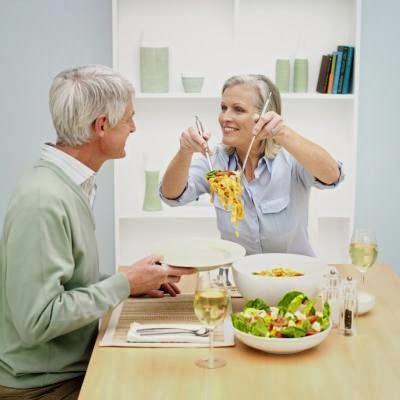 By
By
Like other age groups, elderly people should follow balanced diets that include a variety of healthy foods and minimize their intake of unhealthy foods, such as fried foods, alcohol, and sugary desserts and beverages. Choose foods that are low in cholesterol, trans fats and saturated fats, which can lead to or worsen cardiovascular problems by clogging your blood vessels.
Nutrients
Elderly people might need fewer calories as their activity levels decline, but it's as important as ever for them to obtain proper nutrients. To lower your calorie intake while maintaining proper nutrient levels, choose nutrient-dense foods. For example, elderly people should maintain a high calcium intake to preserve as much bone density as possible, though some bone loss is inevitable due to aging. Regular milk provides calcium, but low-fat milk is more nutrient-dense because fewer calories accompany the same amount of calcium. Generally, nutrient-dense foods include fruits; leafy, green vegetables; lean meats, such as skinless chicken; and fiber-rich foods, such as cereals, seeds, legumes and nuts.
Problems
As you age, physical changes can make eating more difficult or less pleasurable. For example, if you have dentures, it might be harder to chew and your gums might be sore. Some people experience changes in their senses of taste and smell as they age, making food seem less flavorful. Certain medications can change how food tastes. You also might experience diminished appetite or lactose intolerance. If you experience any problems that make getting proper nutrition more difficult, discuss your situation with your doctor or nutritionist to determine what measures you should take.
Supplementation
Your doctor might recommend nutrient supplementation to maintain a healthy intake, especially if you have difficulty getting nutrients through your diet. Typical nutrients elderly people should ensure they obtain in proper amounts include fiber, calcium, protein, vitamins A and C, and folate, notes Colorado State University Extension.
Assistance
If you are elderly and need help getting proper nutrition, or if you know someone who needs assistance, contact your local public health department to learn about regional nutrition programs.
Source: http://www.livestrong.com

No comments:
Post a Comment